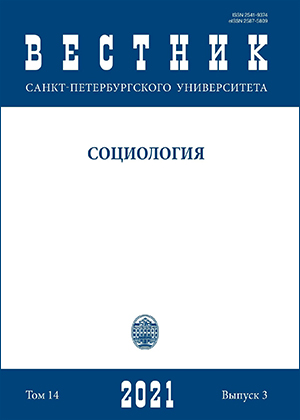Руководители в условиях цифровой экономики: новые вызовы и компетенции
DOI:
https://doi.org/10.21638/spbu12.2021.302Аннотация
Представлен критический анализ современных концепций и результатов исследований компетенций и моделей поведения руководителей в условиях удаленной работы и цифровизации бизнес-процессов. Процесс цифровизации, являясь одним из ведущих трендов на рынке труда, необратимо изменил организации, рабочую среду и процессы, создал новые проблемы, с которыми сталкиваются лидеры. В разных секторах и независимо от размера компании все активнее используются гибкие структуры организации работы, прежде всего удаленный формат, при этом применение современных
цифровых технологий и сервисов позволяет компаниям быстро и эффективно адаптироваться к новым условиям. Дистанционная форма занятости постепенно становится новой глобальной рабочей нормой, открывает огромные возможности для компаний, но и требует другого типа лидерства — «электронного». Новый тип лидерства предполагает значительные изменения отношений руководителя и сотрудников, в том числе лидерских моделей поведения. Электронное лидерство, роль которого в контексте удаленной работы будет заключаться в облегчении условий труда и поддержании мотивации сотрудников к достижению желаемых для организации целей, предполагает
эффективное сочетание электронных и традиционных методов коммуникации и требует развития двух групп ключевых компетенций руководителя: социально-коммуникативных и социально-технологических. Практики электронного лидерства не только смогут обеспечить развитие и реализацию трудового потенциала работника, но и оптимизировать личностные взаимоотношения в процессе трудовой деятельности. Автор демонстрирует потенциал использования концепта электронного лидерства в исследованиях новых условий труда и управления.
Ключевые слова:
цифровизация труда, удаленная работа, управленческие практики, лидерство, электронное лидерство, социально-коммуникативные навыки руководителя, социально-технологические навыки руководителя
Скачивания
Библиографические ссылки
References
Загрузки
Опубликован
Как цитировать
Выпуск
Раздел
Лицензия
Статьи журнала «Вестник Санкт-Петербургского университета. Социология» находятся в открытом доступе и распространяются в соответствии с условиями Лицензионного Договора с Санкт-Петербургским государственным университетом, который бесплатно предоставляет авторам неограниченное распространение и самостоятельное архивирование.




